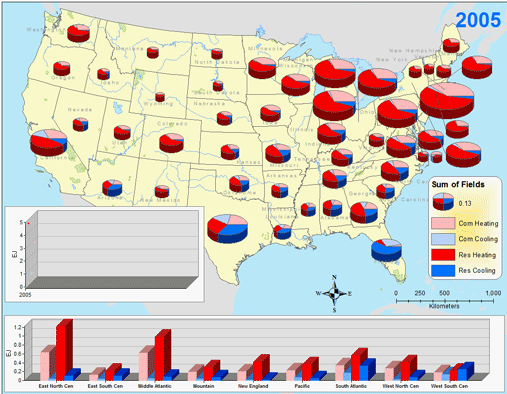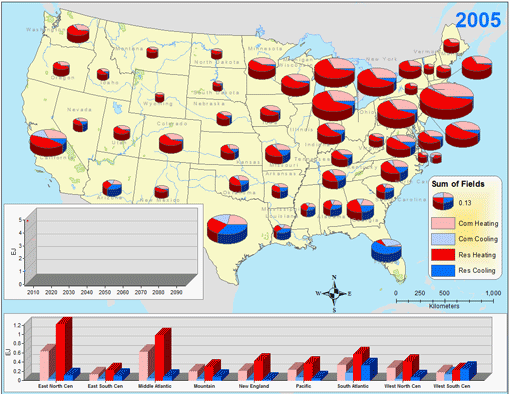URBAN ENERGY
The buildings sector currently account for a large share of buildings final energy demand, for example, 49% of final energy in residential buildings and 44% in commercial buildings, although these percentages will probably decrease with increasing demand for other services in buildings. Climate change is expected to have important impacts on the buildings energy use by decreasing heating and increasing cooling service. Improved understanding of changing climate impacts would help regulators and local utility planners develop better investment strategies that ensure reliable and efficient energy supplies to their service territories. We are working on building energy use modeling for improved understanding of climate change impact on buildings energy use from building level to global scale, which will will offer useful insights into climate policy and energy system planning.
Relevant Publications
*: CORRESPONDING AUTHOR
-
Chen, W., Y. Zhou*, Y. Xie, G. Chen, K. J. Ding & D. Li (2022) Estimating spatial and temporal patterns of urban building anthropogenic heat using a bottom-up city building heat emission model. Resources, Conservation and Recycling, 177, 105996.
-
Chen, W., Y. Zhou*, Q. Wu, G. Chen, X. Huang and B. Yu (2020). Urban Building Type Mapping Using Geospatial Data: A Case Study of Beijing, China. Remote Sensing 12(17).
-
Li, X., Y. Zhou*, S. Yu, G. Jia, H. Li & W. Li, 2019. Urban heat island impacts on building energy consumption: a review of approaches and findings. Energy. 174: 407-419.
-
Clarke, L., J. Eom, E.H. Marten, R. Horowitz, P. Kyle, R. Link, B.K. Mignone, A. Mundra, and Y. Zhou, Effects of long-term climate change on global building energy expenditures. Energy Economics. doi:10.1016/j.eneco.2018.01.003
-
Li, W., Zhou, Y*, Cetin, K.S., Yu, S., Wang, Y., & Liang, B., 2018. Developing a landscape of urban building energy use with improved spatiotemporal representations in a cool-humid climate. Building and Environment, 136, 107-117
-
Güneralp, B., Zhou, Y., Ürge-Vorsatz, D., Gupta, M., Yu, S., Patel, P.L., Fragkias, M., Li, X., Seto, K.C., 2017. Global scenarios of urban density and its impacts on building energy use through 2050. Proceedings of the National Academy of Sciences, 201606035.
-
Li, W., Zhou, Y*., Cetin, K., Eom, J., Wang, Y., Chen, G., Zhang, X., 2017. Modeling urban building energy use: A review of modeling approaches and procedures. Energy.doi:10.1016/j.energy.2017.11.071
-
Scott, M. J., D. S. Daly, J. E. Hathaway, C. S. Lansing, Y. Liu, H. C. McJeon, R. H. Moss, P. L. Patel, M. J. Peterson, J. S. Rice & Y. Zhou, 2015 Calculating impacts of energy standards on energy demand in U.S. buildings with uncertainty in an integrated assessment model. Energy, doi:10.1016/j.energy.2015.06.127
-
McFarland, J., Y. Zhou, L. Clarke, P. Sullivan, J. Colman, W. Jaglom, M. Colley, P. Patel, J. Eom, S. Kim, G. P. Kyle, P. Schultz, B. Venkatesh, J. Haydel, C. Mack & J. Creason (2015) Impacts of rising air temperatures and emissions mitigation on electricity demand and supply in the United States: a multi-model comparison. Climatic Change, 131, 111-125.
-
Yu, S., J. Eom, Y. Zhou, M. Evans, L. Clarke. 2014. An Integrated Assessment of Long-term Impact of China's Building Energy Codes. Energy. 67, 284-297
-
Scott, M., D. Daly, Y. Zhou, H. McJeon, S. Kim, and L. Clarke, 2014. Sub-National Energy and Climate Policy in Residential and Commercial Buildings: An Evaluation of Uncertain Policy Impacts Using Efficient Sensitivity Testing. Energy Economics. 43, 22-33
-
Zhou, Y., L. Clarke, J. Eom, and et al., 2014. Modeling the effect of climate change on U.S. state-level buildings energy demands in an integrated assessment framework. Applied Energy, 113, 1077-1088
-
Chaturvedi, V., S. Kim, S. J. Smith, L. Clarke, Y. Zhou, P. Kyle & P. Patel (2013) Model evaluation and hindcasting: An experiment with an integrated assessment model. Energy, 61, 479–490.
-
Zhou, Y., J. Eom, and L. Clarke, 2013. Coupling Building Energy Use with Spatially Explicit Scenarios of Climate Change and Population Distribution: The Case of the Two Largest Energy-Consuming Countries. Climatic Change. 119 (3-4), 979-992
-
Gurney, K., I. Razlivanov, Y. Song, Y. Zhou, B. Benes, M. Abdulmassih, 2012. Quantification of fossil fuel CO2 emissions at the building/street scale for a large US city. Environmental Science & Technology. 46(21), 12194 - 20202
-
Zhou, Y., and K.R. Gurney, 2010. A new methodology for quantifying on-site residential and commercial fossil fuel CO2 emissions at the building spatial scale and hourly time scale. Carbon Management, 1(1), 45-56

